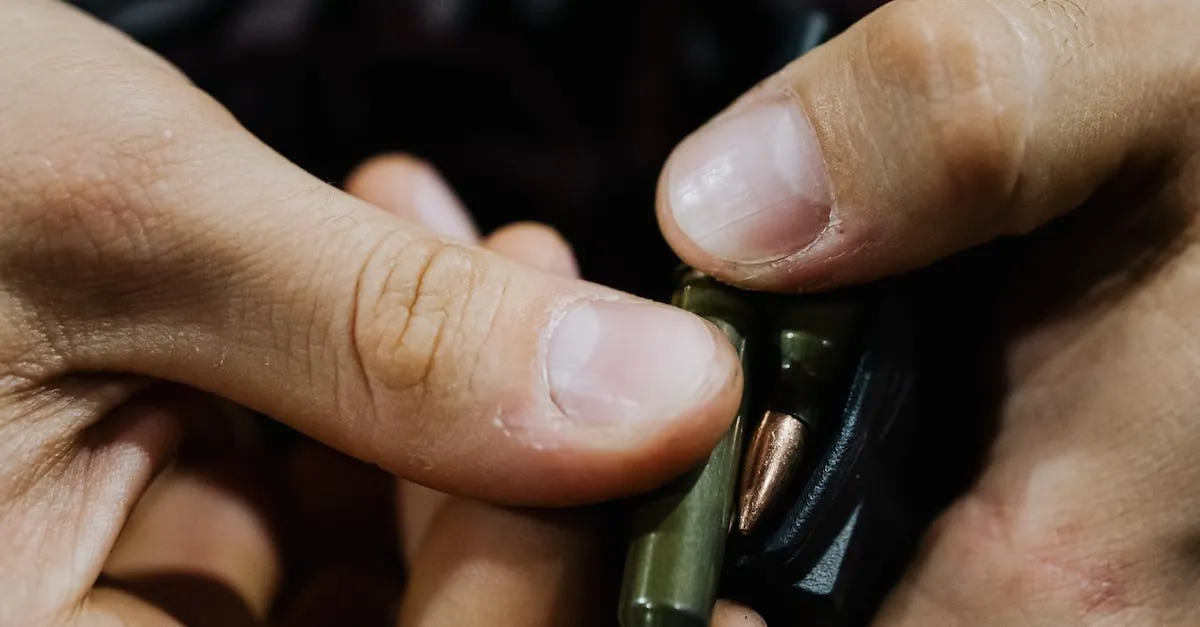How To Lookup A Gun Serial Number In Texas
If you need to identify a firearm by serial number in Texas, there are specific procedures and restrictions in place. This comprehensive guide will explain the background check system, criteria for authorized access, processes for individual owners and law enforcement, and additional resources for researching gun histories in Texas.
Background on Serial Numbers and Gun Checks
Before delving into the process of looking up a gun serial number in Texas, it is important to understand the significance of serial numbers and the role they play in firearm regulation and safety. Serial numbers are unique identifiers assigned to each individual firearm manufactured.
They serve multiple purposes, including facilitating traceability, assisting law enforcement in investigations, and aiding in the identification of stolen or lost weapons.
Purpose and format of serial numbers
Serial numbers are crucial for maintaining a comprehensive record of firearms. They allow manufacturers, distributors, and retailers to track the movement of firearms throughout the supply chain. This traceability is particularly important in preventing the illegal sale and transfer of firearms.
Serial numbers are typically engraved or stamped on a firearm and can vary in format, including a combination of letters, numbers, or both.
Role of FBI and NICS system
The Federal Bureau of Investigation (FBI) plays a vital role in conducting background checks for firearms purchases through the National Instant Criminal Background Check System (NICS). When an individual attempts to purchase a firearm from a federally licensed dealer, the dealer is required to initiate a background check through the NICS.
This system searches various databases, including criminal records, mental health records, and other relevant information, to determine the eligibility of the individual to possess a firearm.
The NICS system does not, however, directly provide information about the history or ownership of a specific firearm. Its primary purpose is to screen potential buyers to ensure they are legally allowed to possess a firearm.
Therefore, if you are looking to obtain information about a gun’s history or previous owners, a background check through the NICS system may not be the appropriate avenue.
Difference between background checks and serial number lookups
It is essential to understand the distinction between a background check and a serial number lookup. While both processes involve firearms, they serve different purposes. A background check, as mentioned earlier, is performed to verify the eligibility of an individual to purchase a firearm.
On the other hand, a serial number lookup is conducted to gather information about a specific firearm, such as its origin, manufacturing date, and potential history.
When it comes to looking up a gun serial number in Texas, there are various resources available, including online databases, manufacturer records, and law enforcement agencies. These sources can provide valuable insights into a firearm’s background, but it’s important to note that not all firearms may be easily traced or have readily available information.
Laws and Policies for Access in Texas
Texas DPS access policies
The Texas Department of Public Safety (DPS) has implemented certain policies regarding the access of gun serial numbers in the state. According to the DPS, access to gun serial number information is restricted to authorized individuals and agencies for law enforcement purposes.
This means that ordinary citizens do not have direct access to this information and cannot simply perform a lookup on their own.
However, there are certain exceptions to this rule. For example, if an individual is a victim of a crime and needs to report a stolen firearm, they may be able to request a lookup through their local law enforcement agency.
Additionally, licensed firearm dealers may have access to the serial numbers of firearms they have sold.
Criteria for authorized access
To gain authorized access to gun serial number information in Texas, individuals and agencies must meet certain criteria. Law enforcement agencies, for instance, must demonstrate that they have a legitimate need for the information and that its use is in accordance with state and federal laws.
They must also adhere to strict data privacy and security protocols to ensure the confidentiality of the information.
Authorized individuals within law enforcement agencies are typically trained on the proper procedures for accessing and using gun serial number information responsibly. They are required to undergo background checks and are held accountable for any misuse or unauthorized disclosure of the information.
Penalties for unauthorized or abusive lookups
Unauthorized or abusive lookups of gun serial numbers in Texas can have serious consequences. The state has implemented penalties to deter individuals from misusing or unlawfully accessing this information.
These penalties can include fines, imprisonment, or both, depending on the severity of the offense.
It is important to note that the unauthorized access or misuse of gun serial number information not only violates state laws but also undermines the integrity of the system designed to keep track of firearms.
By strictly enforcing penalties for unauthorized access, Texas aims to protect the privacy and security of gun owners and maintain the effectiveness of its gun registry system.
Looking Up Serial Number as a Private Citizen
As a private citizen in Texas, it is important to know how to lookup a gun serial number in order to ensure the legality and history of a firearm. While there are certain limitations for private citizens, there are still options available to assist in this process.
Limited options without FFL or LTC
If you do not have a Federal Firearms License (FFL) or a License to Carry (LTC), your options for looking up a gun serial number are limited. The Bureau of Alcohol, Tobacco, Firearms and Explosives (ATF) offers an online tool called the eTrace system, which allows FFL holders to trace firearms.
However, this tool is not accessible to private citizens without an FFL or LTC.
Despite these limitations, there are other avenues you can explore to gather information about a gun’s serial number.
Contacting manufacturer with proof of ownership
If you are the rightful owner of a firearm and have proof of ownership, contacting the manufacturer is a viable option. Many firearm manufacturers keep records of their products and can provide information about the gun based on the serial number.
It is important to provide them with the necessary documentation, such as a bill of sale or registration, to establish your ownership.
Keep in mind that not all manufacturers may keep detailed records or be willing to provide information to private citizens. It is worth reaching out to them and inquiring about their policies regarding serial number lookups.
Seeking help from law enforcement
If you are unable to obtain information on your own, seeking assistance from local law enforcement can be beneficial. They have access to databases and resources that can help trace the history and ownership of a firearm based on its serial number.
By providing law enforcement with the necessary information and proof of ownership, they can assist in verifying the legality and background of the firearm. It is important to note that this process may vary depending on the jurisdiction and policies of the law enforcement agency.
Remember, it is crucial to follow all legal procedures and requirements when obtaining information about a gun’s serial number. Respecting the law and ensuring the proper use and ownership of firearms contributes to a safer community.
Law Enforcement Serial Number Lookup Process
When it comes to looking up a gun serial number in Texas, law enforcement agencies follow specific procedures to ensure the safety and security of their communities. This article will outline the steps involved in the law enforcement serial number lookup process.
Required procedures through Texas DPS/FBI
To initiate a gun serial number lookup, law enforcement agencies in Texas typically begin by contacting the Texas Department of Public Safety (DPS) or the Federal Bureau of Investigation (FBI). These agencies have access to databases that can provide crucial information about the firearm in question.
They may require the submission of relevant details, such as the serial number, make, and model of the firearm.
Law enforcement officials must adhere to strict protocols and guidelines set forth by these agencies to ensure proper handling of sensitive information. This includes verifying the identity and credentials of the requesting officer and following established procedures to maintain the integrity of the investigation.
Getting a trace request processed
Once the necessary information is submitted, the law enforcement agency must wait for the trace request to be processed. This typically involves a thorough search of various databases to gather information about the firearm’s history, including its manufacturer, original purchaser, and any previous transfers.
The processing time for a trace request can vary depending on the workload of the DPS or FBI. However, law enforcement agencies are committed to conducting these investigations in a timely manner to support their ongoing efforts to combat illegal firearms trafficking and ensure public safety.
Role of ATF Firearms Tracing System
The Bureau of Alcohol, Tobacco, Firearms and Explosives (ATF) plays a crucial role in the law enforcement serial number lookup process. The ATF operates the National Tracing Center, which serves as a central hub for firearm trace requests from law enforcement agencies across the country.
The ATF’s Firearms Tracing System enables law enforcement officials to track the movement of firearms throughout the United States. This powerful tool provides valuable insights into the origin and ownership history of a firearm, assisting in criminal investigations and the prevention of illegal firearm activities.
By utilizing the ATF Firearms Tracing System, law enforcement agencies in Texas can access a wealth of information that can aid in solving crimes, identifying potential suspects, and disrupting criminal networks involved in illicit firearms trafficking.
Researching Historical Ownership Records
When it comes to looking up a gun serial number in Texas, researching historical ownership records can provide valuable information about the firearm’s past. Whether you are a collector, historian, or simply curious about the history of a particular firearm, there are several avenues to explore.
FFL bound books and out of business records
One of the primary sources for researching historical ownership records is the Federal Firearms License (FFL) bound books. These books are required by law for licensed firearms dealers to record all transactions, including the acquisition and sale of firearms.
While these records are not publicly accessible, they can be requested by law enforcement agencies or through a Freedom of Information Act (FOIA) request. Additionally, out of business records of former firearms dealers can also be a valuable resource, as they may contain information about past purchases and sales.
Archival permit holder records (pre-1968)
Another avenue for researching historical ownership records is through archival permit holder records, particularly for firearms manufactured before 1968. Prior to the enactment of the Gun Control Act of 1968, firearms were not required to have a serial number.
Instead, individuals were required to obtain a permit from the federal government to purchase a firearm. These records, stored in archives or historical societies, may contain information about the firearm’s original owner, the date of purchase, and other relevant details.
Tips for genealogical, estate, and antique firearms research
If you are conducting genealogical, estate, or antique firearms research, there are a few tips to keep in mind. First, consider reaching out to local historical societies, museums, or firearm collectors’ associations.
These organizations often have resources and expertise in researching historical firearms. Second, explore online databases and forums dedicated to firearms history and genealogy. These platforms can provide a wealth of information and connect you with fellow enthusiasts who may have valuable insights or resources.
Lastly, don’t forget to consult state and local laws regarding the transfer and possession of firearms, as they may vary and impact the availability of historical ownership records.
Conclusion
While private citizens have limited access to search by serial numbers, law enforcement has established procedures through Texas DPS and FBI. With proper documentation, manufacturers or historical archives may also assist with serial number lookups.








